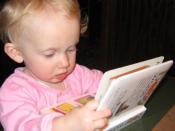A primary concern for Psychology research is depression. Depression affects a great deal of our population and many aspects of an individual's mental health and well-being. In my research of books, articles, and Internet pages on depression, I chose to base my paper mainly on a 1994 article of a study of depression, entitled Depression, Working Models of Others, and Relationship Functioning, by Katherine B. Carnelley, Paula R. Pietromonaco, and Kenneth Jaffe.
This study focuses on the idea that the type of care received in childhood, positive or negative, has a great effect on relationship functioning later in adulthood. But there are two links between child-rearing and relationship functioning: attachment style and depression. Both derive from the type of care received in childhood and affect relationship functioning, and both exert a reciprocal influence on each other in adulthood. The researchers of this study wanted to examine all the correlation's between type of care, attachment style, depression, and relationship functioning.
They proposed a three part hypothesis: 1. A less positive childhood would result in an insecure attachment style and depression, 2. Depressives would exhibit a preoccupied or fearful style of attachment, and 3. attachment style would affect relationship functioning more than depression.
The research was conducted in two independent studies. The first study sampled 204 college women. Women were studied based on the very plausible assumptions that women are more susceptible to depression than men and relationships carry more significance with women than men. The women were screened using the Beck Depression Inventory, a popular method of testing consisting of 21 multiple choice questions to be administered by a clinician. The questions range in scope from feelings of sadness to loss of libido. From these results, a sample of 163 was taken: 73 whose scores indicated mild depression. From this...


